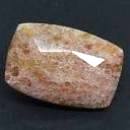|
|
||||||||||||||||
|
||||||||||||||||
|
||||||
|
|
|
|
Tilasite
|
|
| | |
| Discovered in 1895; IMA status: Valid (pre-IMA; Grandfathered) | ||
|
| ||
|
Chemistry |
|
|
| |
|
CaMg(AsO4)F | |
|
|
Calcium Magnesium Arsenate Fluoride |
|
Molecular Weight: |
222.30 gm |
|
Composition: |
Calcium |
18.03 % |
Ca |
25.23 % |
CaO |
|
|
Magnesium |
10.93 % |
Mg |
18.13 % |
MgO |
|
|
Arsenic |
33.70 % |
As |
51.70 % |
As2O5 |
|
|
Oxygen |
28.79 % |
O |
|
|
|
|
Fluorine |
8.55 % |
F |
8.55 % |
F |
|
|
— |
— % |
F | -3.60 % |
-O=F2 |
|
|
|
100.00 % |
|
100.00 % |
= TOTAL OXIDE |
|
|
|
||||
|
Classification |
|
|
| |
|
Phosphates; Subclass: Arsenates | |
|
7/B.25-30 | |
|
|
8 : PHOSPHATES, ARSENATES, VANADATES
|
|
Related to: |
Tilasite Group. Isostructural with Titanite. Durangite-Tilasite Series. Maxwellite-Tilasite Series. |
|
Members of Group: |
Tilasite Group: Durangite, Isokite, Kononovite, Lacroixite, Maxwellite, Panasqueiraite, Tilasite |
|
Varieties: |
None |
|
Synonyms: |
Fluor-Adelite, ICSD 75618, PDF 2-485 |
|
|
|
|
Crystal Data |
|
|
|
|
|
Crystals equant, may be elongated along [100], flattened on {010}, with complex domatic form development, to 3.5 cm; in subparallel groups, granular, in veinlets, massive. |
|
|
On {001}, as contact twins |
|
|
|
|
|
Physical Properties |
|
|
|
|
|
Good on {101}; partings on {133}, {102}, {011} |
|
|
n/a |
|
|
Brittle |
|
|
5.0 |
|
|
3.75 - 3.79 (g/cm3) |
|
|
May fluoresce pale yellow, pale pinkish orange, dark red under SW UV. |
|
|
Not Radioactive |
|
|
Other: |
Piezoelectric. Easily soluble in HCl or HNo3. |
|
Health Warning: |
Contains arsenic - always wash hands after handling. Avoid inhaling dust when handling or breaking. Never lick or ingest. |
|
|
|
|
Optical Properties |
|
|
|
|
|
Milky white, gray, violet-gray, rose-red, olive-green, apple-green; colorless or pale green in transmitted light |
|
|
Translucent |
|
|
Resinous, vitreous on cleavages |
|
|
1.640 - 1.675 Biaxial ( - ) |
|
|
0.035 |
|
|
Relatively weak, slight; r < v |
|
|
None |
|
|
|
|
|
Occurances |
|
|
|
|
|
Geological Setting: |
Typically in metamorphosed manganese or zinc deposits containing arsenic. |
|
Common Associations: |
Manganoan Diopside, Manganberzeliite, Svabite, Allactite, Pyroaurite, Dixenite, Bergslagite, Hematite, Calcite, Barite (Långban, Sweden); Spessartine, Braunite, Barite, Quartz (Kajlidongri, India); Friedelite, Willemite, Barite (Sterling Hill, New Jersey, USA). |
|
Common Impurities: |
None |
|
Type Locality: |
Långban, Filipstad, Värmland, Sweden |
|
Year Discovered: |
1895 |
|
View mineral photos: | |
|
|
|
|
Unusual Gem Categories |
|
|
|
|
|
|
Fluorescent Gems, Piezoelectric Gems |
|
|
|
|
More Information |
|
|
|
|
|
| |
|
|
|
|
Tilasite was named in 1895 by Stens Anders Hjalmar Sjögren in honor of Daniel Tilas (1712-1772), polymath, geologist, mining engineer, director of mines, and regional governor from Stockholm, Sweden. Tilasite
distribution: from
Långban, Filipstad, Värmland, Sweden. In
Switzerland, from the Falotta mine, Oberhalbstein, Graubünden,
and on the west flank of Cherbadung [Pizzo Cervandone],
Binntal, Valais. On the east flank of Pizzo Cervandone,
Alpe Devero, Val d’Aosta, Piedmont, and at Val Strona,
Ossola, Italy. From the Urupskoye copper deposit, northern
Caucasus Mountains, Russia. At Sailauf, northeast of
Aschaffenburg, Bavaria, Germany. From near Nežilovo,
Macedonia. At Kajlidongri, Madhya Pradesh, India. From
Guettera, Algeria. In the Puttapa zinc deposit, near
Beltana, South Australia. In the USA, at Sterling Hill,
Ogdensburg, Sussex County, New Jersey; from the White
Tail Deer mine, Bisbee, Cochise County, Arizona; in
the Monticello tin district, Sierra County, New Mexico.
|
|
|
We
have not photographed our Tilasite
gems yet. Please
check back soon. |
